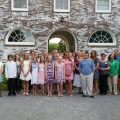The Bay Watershed Education and Training (B-WET) program is an environmental education grant program funded by the National Oceanic and Atmospheric Administration (NOAA) that promotes locally relevant and authentic experiential STEM learning for K-12 students and teachers. B-WET fosters the growth of new, innovative programs and encourages capacity-building and environmental education partnerships. Funded projects advance ocean, climate, and other environmental literacy principles that focus on the importance of watershed health and environmental stewardship. To date, Blandy has secured two B-WET grants for projects in partnership with two Virginia school divisions.
Facilitators’ Guide to MWEE Training. Do you desire to create your own watershed education program but don't know where to begin? This guide, which Blandy helped create, provides guidance, planning templates, and resource suggestions to get you on your way!
Read below to learn more about our watershed projects and to explore resources to use when teaching your own Meaningful Watershed Education Experience (MWEE)!
Clarke County Public Schools Watershed Project
 This MWEE project (clickable link) develops interdisciplinary environmental literacy curricula that span all grades, kindergarten through grade 12. Students are engaging in field-based investigations focused on land use and land management, water quality and how this affects organism health and human use of our waterways, and about numerous organisms that are native to our watershed system.
This MWEE project (clickable link) develops interdisciplinary environmental literacy curricula that span all grades, kindergarten through grade 12. Students are engaging in field-based investigations focused on land use and land management, water quality and how this affects organism health and human use of our waterways, and about numerous organisms that are native to our watershed system.
This video is one in a five-part series around NAAEE's Community Engagement Guidelines for Excellence and highlights our NOAA B-WET Project.
This project is funded through an award from the National Oceanic and Atmospheric Association, Award # NA18NMF4570315
Frederick County, VA Watershed Project
 This MWEE project focused on field and classroom investigations as sixth-graders examined and evaluated the potential effects of human activities on existing environmental and cultural resources at Blandy and at their schools. Students created environmental impact statements that were shared with the community.
This MWEE project focused on field and classroom investigations as sixth-graders examined and evaluated the potential effects of human activities on existing environmental and cultural resources at Blandy and at their schools. Students created environmental impact statements that were shared with the community.
Investigative Question
“Where should Blandy Experimental Farm build its proposed education center?”
Project Design
All 6th-grade students conducted investigations in the field and in their classrooms examining and evaluating the potential effects of human activities on existing environmental and cultural resources at Blandy and at their schools. At the end of each school year, select groups of students presented their proposals for land management to the Foundation of the State Arboretum Board and to their school communities.
Strategies and Logistics
Blandy and Frederick County Public Schools educators used multi-disciplinary, problem-based learning (PBL) approach to guide 1000 6th-grade students through the problem-solving process.
Students visited Blandy twice each school year (fall and spring) to assess environmental and historic/cultural resources and the potential effects that the development of a building site could have on these resources. Each field investigation day was preceded and followed by work in core content classes.
This project was funded through an award from the National Oceanic and Atmospheric Association, Award # NA14NMF4570265